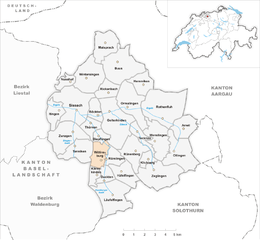Wittinsburg
| Wittinsburg | ||
|---|---|---|
|
||
| Coordinates: 47°26′N 7°51′E / 47.433°N 7.850°ECoordinates: 47°26′N 7°51′E / 47.433°N 7.850°E | ||
| Country | Switzerland | |
| Canton | Basel-Landschaft | |
| District | Sissach | |
| Area | ||
| • Total | 3.21 km2 (1.24 sq mi) | |
| Elevation | 573 m (1,880 ft) | |
| Population (Mar 2016) | ||
| • Total | 433 | |
| • Density | 130/km2 (350/sq mi) | |
| Postal code | 4443 | |
| SFOS number | 2867 | |
| Surrounded by | Buckten, Diegten, Diepflingen, Gelterkinden, Känerkinden, Rümlingen, Tenniken, Thürnen | |
| Website |
www SFSO statistics |
|
Wittinsburg is a municipality in the district of Sissach in the canton of Basel-Country in Switzerland.
Wittinsburg has an area, as of 2009[update], of 3.21 square kilometers (1.24 sq mi). Of this area, 1.92 km2 (0.74 sq mi) or 59.8% is used for agricultural purposes, while 1.02 km2 (0.39 sq mi) or 31.8% is forested. Of the rest of the land, 0.26 km2 (0.10 sq mi) or 8.1% is settled (buildings or roads).
Of the built up area, housing and buildings made up 3.4% and transportation infrastructure made up 4.0%. Out of the forested land, all of the forested land area is covered with heavy forests. Of the agricultural land, 41.7% is used for growing crops and 14.6% is pastures, while 3.4% is used for orchards or vine crops.
The blazon of the municipal coat of arms is Per pale Sable and Or, two corn ears counterchanged.
Wittinsburg has a population (as of March 2016[update]) of 433. As of 2008[update], 3.6% of the population are resident foreign nationals. Over the last 10 years (1997–2007) the population has changed at a rate of 22.7%.
Most of the population (as of 2000[update]) speaks German (326 or 97.3%), with Serbo-Croatian being second most common (5 or 1.5%) and French being third (1 or 0.3%).
As of 2008[update], the gender distribution of the population was 49.8% male and 50.2% female. The population was made up of 399 Swiss citizens (95.9% of the population), and 17 non-Swiss residents (4.1%) Of the population in the municipality 142 or about 42.4% were born in Wittinsburg and lived there in 2000. There were 100 or 29.9% who were born in the same canton, while 73 or 21.8% were born somewhere else in Switzerland, and 14 or 4.2% were born outside of Switzerland.
...
Wikipedia



